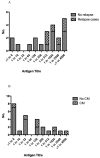Screening for cryptococcal antigenemia in patients accessing an antiretroviral treatment program in South Africa
- PMID: 19222372
- PMCID: PMC2875173
- DOI: 10.1086/597262
Screening for cryptococcal antigenemia in patients accessing an antiretroviral treatment program in South Africa
Abstract
Background: Cryptococcal meningitis is a leading cause of death in patients with acquired immunodeficiency syndrome and contributes substantially to the high early mortality in antiretroviral treatment (ART) programs in low-resource settings. Screening for cryptococcal antigen in patients who enroll in ART programs may identify those at risk of cryptococcal meningitis and permit targeted use of preemptive therapy.
Methods: In this retrospective study, cryptococcal antigen was measured in stored plasma samples obtained from patients when they enrolled in a well-characterized ART cohort in South Africa. The predictive value of screening for cryptococcal antigen before initiation of ART for development of microbiologically confirmed cryptococcal meningitis or death during the first year of follow-up was determined.
Results: Of 707 participants with a baseline median CD4 cell count of 97 cells/microL (interquartile range, 46-157 cells/microL), 46 (7%) were positive for cryptococcal antigen. Antigenemia was 100% sensitive for predicting development of cryptococcal meningitis during the first year of ART, and in multivariate analysis, it was an independent predictor of mortality (adjusted hazard ratio, 3.2; 95% confidence interval, 1.5-6.6). Most cases (92%) of cryptococcal meningitis developed in patients with a CD4 cell count <or= 100 cells/microL. In this subset of patients, a cryptococcal antigen titer >or 1:8 was 100% sensitive and 96% specific for predicting incident cryptococcal meningitis during the first year of ART in those with no history of the disease.
Conclusions: Cryptococcal antigen screening before initiation of ART in patients with a CD4 cell count <or=100 cells/microL is highly effective for identifying those at risk of cryptococcal meningitis and death and might permit implementation of a targeted preemptive treatment strategy.
Figures

References
-
- French N, Gray K, Watera C, et al. Cryptococcal infection in a cohort of HIV-1-infected Ugandan adults. AIDS (London, England) 2002 May 3;16(7):1031–8. - PubMed
-
- Okongo M, Morgan D, Mayanja B, Ross A, Whitworth J. Causes of death in a rural, population-based human immunodeficiency virus type 1 (HIV-1) natural history cohort in Uganda. Int J Epidemiol. 1998 Aug;27(4):698–702. - PubMed
-
- Corbett EL, Churchyard GJ, Charalambos S, et al. Morbidity and mortality in South African gold miners: impact of untreated disease due to human immunodeficiency virus. Clin Infect Dis. 2002 May 1;34(9):1251–8. - PubMed
-
- Gordon SB, Walsh AL, Chaponda M, et al. Bacterial meningitis in Malawian adults: pneumococcal disease is common, severe, and seasonal. Clin Infect Dis. 2000 Jul;31(1):53–7. - PubMed
-
- Hakim JG, Gangaidzo IT, Heyderman RS, et al. Impact of HIV infection on meningitis in Harare, Zimbabwe: a prospective study of 406 predominantly adult patients. AIDS (London, England) 2000 Jul 7;14(10):1401–7. - PubMed
Publication types
MeSH terms
Substances
Grants and funding
LinkOut - more resources
Full Text Sources
Other Literature Sources
Medical
Research Materials

